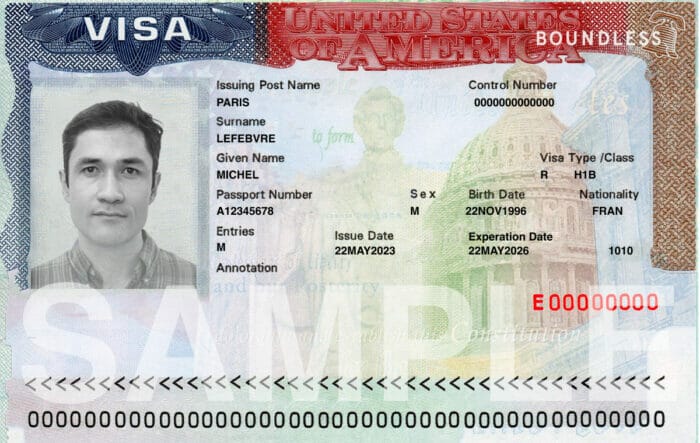
Due to its increasing popularity in the business immigration space, the H-1B program has an annual numerical limit, or “cap,” on the number of visas available each year. When the number of H-1B petitions submitted by employers exceeds the annual cap, U.S. Citizenship and Immigration Services (USCIS) conducts a lottery to randomly select the petitions that will be considered for processing.
The H-1B cap lottery is a result of the high demand for H-1B visas, and it can be a competitive process for both employers and prospective employees seeking to obtain H-1B status in the U.S. If you’re a foreign worker who wasn’t selected in the H-1B cap lottery, or you’re an HR professional tasked with helping international employees secure work visas, it’s important to explore alternative visa options available.
Here’s an overview of some alternative nonimmigrant visas that may be available in lieu of an H-1B:
L-1 Intracompany Transferee Visa
The L-1 Intracompany Transferee visa is a non-immigrant visa category that allows multinational companies to transfer certain employees in managerial positions to their U.S. offices. If your company has offices or entities overseas, and the employee in question possesses specialized knowledge or executive/managerial roles within the company, they may be eligible for an L-1 visa. Learn more here.
O-1 Extraordinary Ability Visa
The O-1 visa is a non-immigrant visa available for individuals who possess extraordinary ability or achievement in their field, whether it be the sciences, arts, education, business, or athletics. The application process involves a detailed presentation of the individual’s accomplishments and contributions to their field. Learn more about the eligibility requirements here.
F-1 OPT STEM Extension
Employees currently working under an Employment Authorization Document (EAD) on F-1 Optional Practical Training (OPT) status may qualify for a 24-month extension of their OPT work authorization if their completed degree and the offered position are in a STEM field. You can learn more about how to hire an international student on OPT in Boundless’ guide.
J-1 Trainee or Intern Program
The J-1 visa program includes a category for trainees and interns, allowing individuals to participate in educational and cultural exchange programs in the U.S. There are two distinct categories within the J-1 Trainee and Intern Visa:
- J-1 Trainee Visa: This category is designed for individuals seeking training in a specific field that is not readily available in their home country. The trainee must have a degree or professional certificate and at least one year of work experience in their occupational field outside the United States. The maximum duration for a J-1 Trainee Visa is 18 months.
- J-1 Intern Visa: This category is for individuals who are currently enrolled in or have recently graduated from a post-secondary educational institution outside the United States. The internship must be directly related to their academic field of study. The maximum duration for a J-1 Intern Visa is 12 months.
B-1/B-2 Tourist Visa
If an H-1B employee’s current status is expiring and they have not been approved for an extension, it may be possible for them to apply for a travel visa to remain in the country temporarily while they explore other immigration options. The B-1/B-2 tourist visa can be a good method to stay in the U.S. legally, but it does not come with work authorization.
You can learn more about changing status from an H-1B visa to a B-1/B-2 tourist visa in Boundless’ guide.
E-2 Treaty Investor Visa
The E-2 visa is a non-immigrant visa that allows foreign nationals to work in the U.S. based on a substantial investment in a U.S. business. It is specifically designed for individuals from countries with which the U.S. has a treaty of commerce and navigation.
If an employee’s company is entirely owned by a country that has a treaty of commerce and navigation with the United States, and they are a national of that same country, they may be eligible for the E-2 visa. Learn more here.
E-3 Visa for Australian Citizens
If the employee in question is an Australian citizen, and they work in a specialty occupation within a professional field, they may be eligible for an E-3 visa.
TN Visa for Canadian and Mexican Citizens
For H-1B holders who are Canadian or Mexican citizens, they consider applying for the TN work visa. The TN nonimmigrant visa is specifically for Canadian and Mexican workers employed in certain professional occupations, including but not limited to, science, engineering, teaching, and various other professions.
Initially, TN visas are granted for up to three years, with the possibility of extensions in three-year increments. There is no maximum limit on the number of renewals, and TN visa holders can continue working in the U.S. as long as they maintain their eligibility. Learn more in our TN guide.
H-1B1 for Chilean and Singaporean Citizens
The H-1B1 visa is available to citizens of Chile and Singapore who wish to work temporarily in the U.S. in a specialty occupation that typically requires a higher education degree or its equivalent. The H-1B1 visa is initially granted for up to one year, with the possibility of extensions in one-year increments.